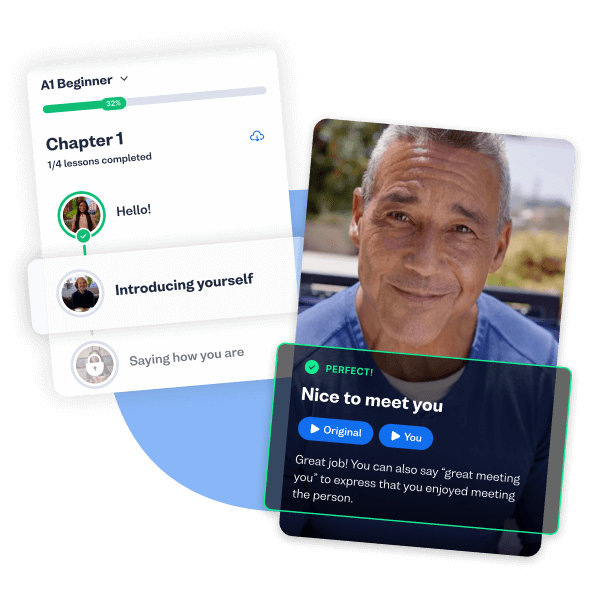The 5 Most Useful Languages to Learn
Learning these power languages can open a lot of doors for you
I want to learn...
With between 6,000 and 7,000 languages in the world, choosing your next one to learn isn’t an easy task. Some people choose a new language because it looks fun. Other people are interested in taking advantage of the opportunities languages give.
So you can make an informed decision about which language will give you the best opportunities, this article breaks down the most useful languages in the world.
The opportunities you get from learning a new language
Useful is subjective. If you live in an area with lots of Polish people, then Polish is a useful language for you. Or if you recently made a friend from Thailand, Thai would be a good one to learn.
It’s impossible to say the most useful language for everyone’s specific needs. But there is a scientific way to find the most powerful languages in the world. These languages are generally useful and can help you in your life and career.
Let’s talk about how a language can be useful for you. In his research into powerful languages, Dr. Kai L. Chan, Distinguished Fellow at INSEAD Innovation and Policy Initiative, breaks down the usefulness of language into the following five categories.
-
Geography. Languages that people in several countries use are more useful for traveling.
-
Economy. Languages used in prosperous countries are useful for business.
-
Communication. Languages with lots of native and second-language speakers are useful for communication. The more commonly-spoken languages you know, the more people you can communicate with.
-
Knowledge and media. Some languages are more useful for consuming content and entertainment media, and taking part in academia.
-
Diplomacy. International organizations have official languages. So if you want to work in international relations, some are more useful than others.
English is number one in Dr Chan’s study because it scores highly over those five categories. But what about the other useful languages in the world?
Let’s take a look at five languages that score highly for those five categories. Each of these languages has a ton of benefits. And best of all, you can start learning them today.
The top 5 most useful languages to learn
1. Mandarin Chinese
When it comes to communication, Mandarin Chinese comes out on top. With 1+ billion people speaking Mandarin Chinese and Chinese communities all over the world — from New Zealand to North America via South East Asia — you’ll never lack someone to talk with. It doesn’t matter where you live or where you visit, you’re almost certainly able to communicate in Mandarin Chinese.
Learning Mandarin Chinese also has another huge advantage. As China is one of the biggest economies in the world, there are countless business opportunities there. If you’re learning a language to help your business, Mandarin Chinese is going to be super useful.
We should also mention Chinese culture. With a burgeoning movie scene, entertainment from China is getting more popular. And for the history buffs out there, what could be better than learning about 1,000 years of Chinese history in Chinese?
2. French
French is one of the most popular languages to learn and for good reason. Although the population of Native French speakers is low, you’ll hear French throughout Europe, sub-Saharan Africa, and Canada. Your French phrasebook — or language learning app — can get you pretty far around the world.
But the main reason French is on this list is because of its importance in international relations. Many international organizations — the UN, the EU, and the international courts, for example — use French as their official language. English has started to take over French as the lingua franca of diplomacy. But for anyone interested in a career in diplomacy, French is one of the most useful languages to learn.
3. Spanish
More people speak Spanish than any other language except Mandarin Chinese and it’s the official language of 21 countries. You can travel from the bottom of Argentina to North America or around Europe and use Spanish everywhere you go. Only English rivals Spanish when it comes to how widespread the language is.
It’s also one of the most popular second languages in the world — around 100 million of the world’s 550+ million Spanish speakers are second language learners — so you’ll never be short of someone to learn with. This means it’s one of the easiest languages to learn because you’re guaranteed to have some Spanish speakers nearby to practice with.
4. Russian
We can’t talk about geography without mentioning Russia — the biggest country in the world. From the easternmost point of Asia to Latvia and Estonia in Europe, there are lots of Russian speakers. Plus Russian is part of the Slavic language family so it can give you a head start with learning other Eastern-European languages. For people interested in the world east of Germany, there’s no more useful language than Russian.
And let’s not forget Russia’s contributions to classic literature. There’s nothing cooler than reading Dostoevsky or Tolstoy in its original language. Of course, getting to that level won’t be easy, but who doesn’t love a challenge?
5. Arabic
300 million people in 22 countries in the Middle East and North Africa use Arabic. Learning Arabic can connect you with 300 million native speakers, a fascinating history of civilization, and the world’s second-biggest religion — Islam.
Much like knowing French can help you understand Spanish. Knowing Arabic can help you understand Persian, Hebrew, Turkish, and Farsi. It’s a must for anyone interested in North Africa and the Middle East as no other language can open as many doors for you in that part of the world.
Learn with Busuu, increase your possibilities
Learning the most useful languages in the world brings tons of new possibilities. Master different languages with Busuu, the language learning app. Practice with native speakers, complete online courses, and don’t let chances pass you by.
Recommended articles
- Common Business Acronyms and Their Meanings
- Japanese Pronouns: A Complete Guide for Beginners
- Italian Numbers 1 to 100: Learn How to Count
- What Are Tag Questions in English?
- Colors in French: Names and Pronunciation
- Months in Spanish: How to Write & Pronounce Them
- Articles in English (a, an, the): How to Use Them?
- Spanish Demonstratives Pronouns and Adjectives
- How to Write an Email in English: Tips & Examples
- Days of the Week in Italian: Top Tricks to Remember them
- Seasons in Italian: A Guide to the Four Seasons
- Learn Portuguese With Our App
New articles
- How to Use Podcasts to Learn a Language
- Japanese Verb Conjugation: All the Basics You Need
- Spanish Past Tense Conjugation (with Charts)
- Sicilian vs Italian Language: A Comparison
- English Possessive Adjectives: Definition & Examples
- Accusative Case for Direct Objects in English
- Japanese Honorifics: San, Chan, Kun and Beyond
- App Review: Open University Research Study
- Colors in Italian: How to Say & Use the Main Colors
- French Indirect Object Pronouns: A Quick Guide
- Spanish Numbers: How to Count From 1-100
- Conditional Sentences: the 5 Types (with Examples)

